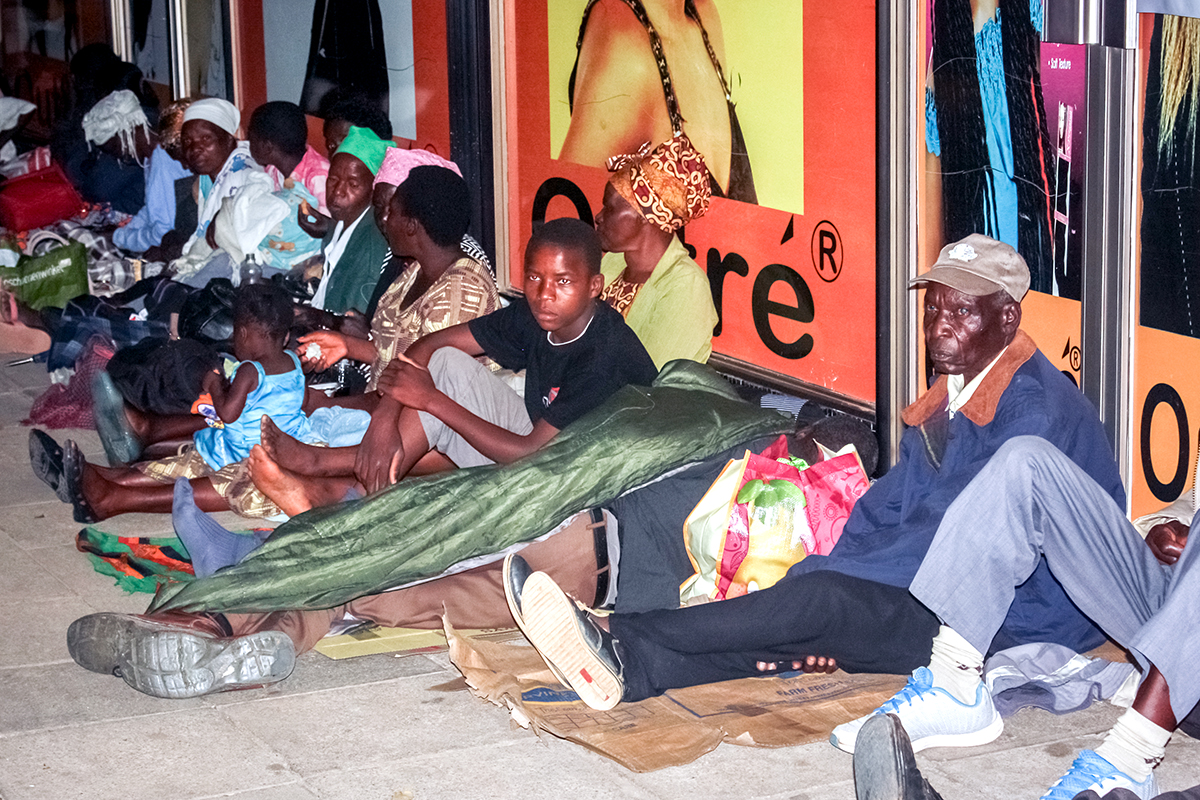
Fortune Moyo, GPJ Zimbabwe
Seniors camp out on the pavement outside a local bank in Bulawayo as they wait in line to withdraw their monthly pensions. Most of them travel long distances from rural homes to access their funds in cities and towns, and sometimes must wait days to withdraw the full amount each month.
MUTARE, ZIMBABWE — Around 6 p.m. the night before the 13th of each month, pensioners start trickling in from all over Manicaland province. They queue up here in Zimbabwe’s fourth-largest city, taking their places on the pavement outside the OK Arcade to ensure they will be among the first 100 customers when the People’s Own Savings Bank’s (POSB) Mutare branch opens the next morning.
Sleeping in line overnight increases the chances of withdrawing in a single day all, or at least most, of their $60 monthly pension that the National Social Security Authority (NSSA) deposits for them. Zimbabwe’s constitution entitles all citizens 70 or older to $60 in social security benefits.
To prevent banks from running out of cash, the government in late 2016 imposed withdrawal limits, which now stand at $100 per day and $300 per week. Yet banks still run out. This poses special problems for elderly citizens who have to travel long distances to receive their pensions not only in Mutare, but in other cities as well.
Sleeping on the Sidewalk
Angelina Kasambira travels from her rural home in Chakohwa about 80 kilometers (50 miles) away twice a month — once for her social security funds and another time to collect her deceased husband’s pension. She takes the bus and pays $3 each way. Even though she has a place to stay in town, she must sleep on the street in front of the bank to secure her place in line.
“Sometimes, even after booking a spot among the first people in the queue, the bank may give you half or less from the $60 NSSA pension fund,” she says. “I sometimes spend at least three days to get the money being given $25 withdrawal limits because the bank will not have a lot of cash.”
Sleeping on the street is uncomfortable — there are no toilets or sources of drinkable water — and it is risky.
“We are exposed to harsh weather conditions as well as risk being robbed while sleeping on the pavements,” says Musaiziya Chimberengwa, 42, who comes from Nhedziwa, some 90 kilometers (about 55 miles) away, to collect her husband’s pension.
“The days I am here waiting to withdraw the money, which sometimes takes two to three days, make me lose out on my work in the fields back home, considering that we are in the farming season,” she says.
Ellen Ncube, 51, who comes to collect the pension fund on behalf of her elderly mother-in-law, says that last year the bank suggested it would initiate a mobile money transfer through the NetOne mobile network, but that hasn’t worked out because vendors prefer cash.
“At times, as soon as the bank opens, the bank manager comes out and tells us there is no cash and that we should go and swipe [bank cards] in shops. To get cash in shops you have to buy groceries and get [a] cash-back facility equivalent to what you buy. This is not fair,” Ncube says. “What we need is the cash, not groceries.”
John Ndaramo, 77, spends $10 one way on bus fare from Chimanimani, about 120 kilometers (75 miles) south of Mutare near the Mozambique border.
“I was a truck driver for 45 years and now in my old age when I expect to rest, I have to struggle to get my pension money,” he says. “Government should really intervene to help us senior citizens. NSSA should change and deposit our pension fund in another bank if POSB is failing to serve us.”
Bank Policy
POSB public relations officer Simukayi Mutamangira said the bank’s policy is to serve senior citizens first so they shouldn’t even have to stand in queue let alone wait overnight on the street. He added that in some cases an additional counter can be opened to ensure senior citizens get faster service.
Mutamangira says the POSB takes special care of seniors in other ways too. Account holders 75 or older are exempt from bank charges, he says, while customers from 65 to 74 years have reduced charges. He says the bank tries its best to equitably distribute the money.
While the NSSA provides a list of pensioners and electronically transfers the funds to be paid out on the 13th each month, Mutamangira says, “all the money in banks comes from the Reserve Bank of Zimbabwe and amongst that (NSSA pensions fund) there is also money for all other customers.”
Pensioners in Mutare say the bank used to serve them first so they didn’t have to stand in lines. But that was before the cash crisis began in early 2016.
Special Efforts Needed
Blessing Nyamaropa, regional manager for Zimbabwe Lawyers for Human Rights Manicaland and Masvingo, says both NSSA and POSB should take special efforts to pay pensioners on the 13th of each month.
The current situation, Nyamaropa says, “is a violation of the rights of the elderly. This is disrespectful of our senior citizens who should be assisted by all means.”



Evidence Chenjerai, GPJ reporter, translated some interviews from Shona.






